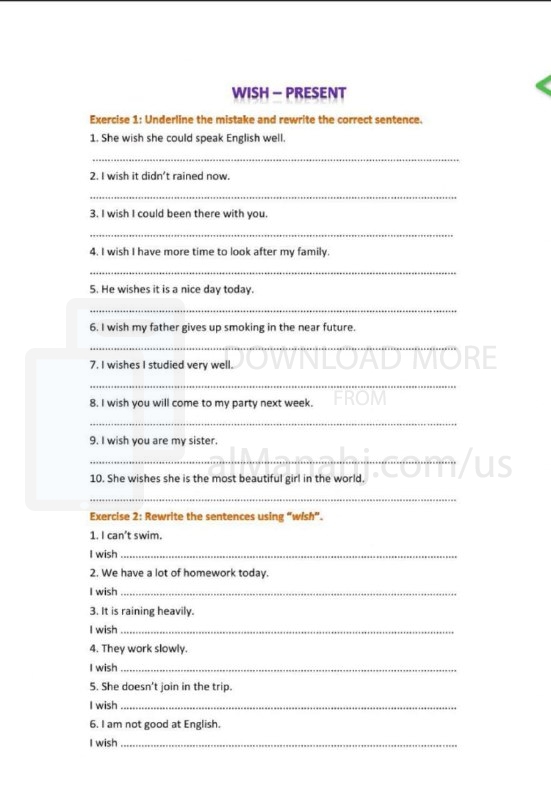| File info: Wish sentences are used to express regrets, desires, or wishes about situations that are not currently true or likely to happen. They are structured using the verb "wish" followed by a clause or phrase that describes the desired or regretted situation. Here's a description of wish sentences:
1. Expressing regrets or desires about the present:
- "I wish I had more free time." (Expressing a desire for more free time that is currently lacking)
- "She wishes she were more confident." (Expressing a regret about a perceived lack of confidence)
- "We wish it wasn't raining." (Expressing a desire for the current situation of rain to be different)
1. Expressing regrets or desires about the past:
- "I wish I had studied harder for the exam." (Expressing regret about not studying harder in the past)
- "He wishes he hadn't said that." (Expressing regret about something said in the past)
- "They wish they had traveled more when they were younger." (Expressing a desire to have traveled more in the past)
1. Expressing regrets or desires about the future:
- "I wish I could visit Paris someday." (Expressing a desire to visit Paris in the future)
- "She wishes she could speak fluent French by next year." (Expressing a desire to achieve fluency in French in the future)
- "We wish it wouldn't be so hot next summer." (Expressing a desire for the future summer to be less hot)
1. Expressing hypothetical or unreal situations:
- "I wish I were a bird." (Expressing a desire for a hypothetical situation of being a bird)
- "She wishes she could travel back in time." (Expressing a desire for an unreal situation of time travel)
- "We wish we had a magic wand." (Expressing a desire for an imaginary situation of having a magic wand)
In wish sentences, the verb "wish" is followed by a variety of verb forms, including past simple, past perfect, could, and were (used for hypothetical or unreal situations). The structure of the sentence depends on the tense or aspect of the desired or regretted situation. Wish sentences are commonly used in everyday conversation, writing, and storytelling to convey aspirations, regrets, or hopes for different circumstances. |
